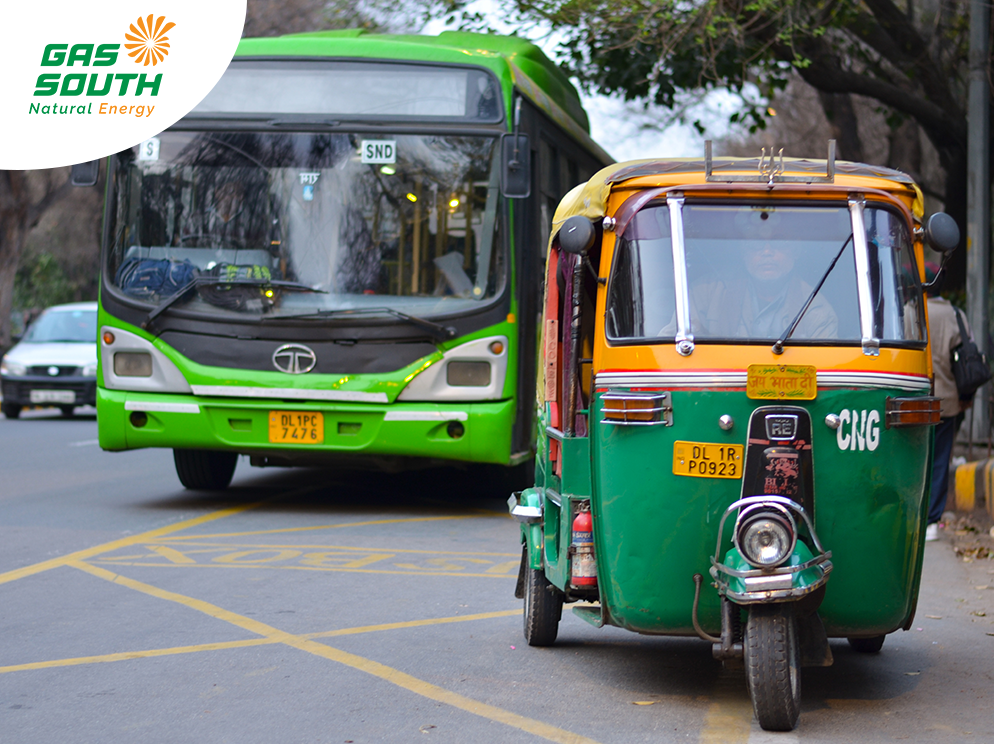Compressed Natural Gas (CNG) is used as a fuel for various vehicles, helping to save costs, extend the lifespan of equipment, and reduce emissions compared to other fuels. Moreover, CNG is also supplied to factories and industrial zones that utilize thermal energy in their production. With Gas South, let's explore some prominent applications of CNG in the following.
1. CNG’s Application
1.1. Transportation and logistics.
Compressed Natural Gas (CNG) is used as an alternative fuel to replace gasoline and diesel in various vehicles. Thanks to dual-fuel engine conversion technology (gasoline/CNG), most of the current vehicles can operate using CNG as a fuel or in combination with other fuels like gasoline or diesel. CNG-vehicles not only offer environmental benefits but also prove to be more economically efficient. In addition to cars and buses, in some countries, trains that traditionally run on diesel have been upgraded to run on CNG as well.

In Vietnam, Ho Chi Minh City began operating its first compressed natural gas (CNG) bus route in 2009. This solution has brought many benefits, including high safety standards, environmental friendliness, and lower fuel costs, among others. Each CNG- bus can save over 8,300 USD per year compared to diesel fuel usage.
1.2. Industrial production
CNG is used as a fuel in the steel manufacturing industry, building materials production, food processing, and electronic components.
2. Benefits of Using CNG
Using CNG as an alternative fuel to gasoline and diesel not only contributes to environmental protection but also brings significant economic advantages. Specifically:
-
Reduce emissions by to 20% of CO2, 30% of NOx, and 70% of SOx compared to diesel-based fuels. The amount of hydrocarbons in CNG engines' exhaust is up to 50% lower than gasoline engines. The cost for vehicles using CNG is approximately 30-40% lower than those running on gasoline or diesel.
-
Extends the lifespan of machinery and equipment while reducing maintenance costs due to cleaner and more efficient combustion.
-
Cost savings are achieved through competitive pricing and energy content, along with higher combustion efficiency.
-
Natural gas compression fewer harmful emissions, leading to cost savings in environmental treatment.
Alongside numerous advantages, CNG has some drawbacks, such as inefficiency in long-distance transportation to consumption points, requiring more storage space on vehicles, and longer refueling time compared to gasoline or diesel. Although CNG is a fossil fuel emitting CO2, it remains the cleanest fossil fuel.
Gas South is proud to be the only company providing CNG to more than 600 buses in Ho Chi Minh City. In addition, our customers are reputable and large corporations from various industries such as Pomina Steel, Nam Kim Steel, VinaOne, SeAH, and TVP in the steel and sheet metal industry; King Minh, Granite Dong Nai, Gach Ngoi Dong Nai, and Y My in the construction materials industry; Samsung in the electronics sector; Bellinturf, Deltech, Net washing powder, and Ojitex in the consumer goods sector; Long Giang Industrial Park, Long Duc - Sojitz Industrial Park in industrial parks; and SaigonBus and Cooperative Alliance in the transportation sector.



